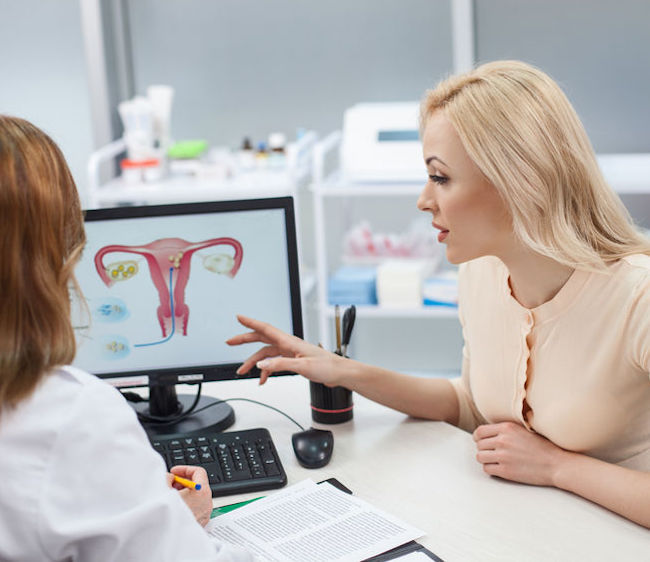Ectopic pregnancy: causes, symptoms, treatment

It is also known as extrauterine pregnancy or tubal pregnancy, being a condition that occurs in 2% of pregnancies. It is characterized by the implantation of the fertilized egg outside the uterus. In most cases of an ectopic pregnancy, it develops in one of the fallopian tubes but can also be placed in the cervix, ovary or abdominal cavity. Ectopic pregnancy: causes Ectopic pregnancy: symptoms Ectopic pregnancy: risk factors Ectopic pregnancy: diagnosis Ectopic pregnancy: treatment Ectopic pregnancy: complications and prophylaxis Ectopic pregnancy: causes One of the main causes of extrauterine pregnancy is the existence of an abnormal tube, . Uterine tube problems may occur for a number of reasons, the most common being pelvic inflammatory disease (caused by Chlamydia or gonorrhea), surgery at its level, the existence of an earlier ectopic pregnancy. Very rarely, attempts to have a pregnancy after implantation of an intrauterine device (sterile) or after the tubal ligation has been performed pose the risk of being extrauterine.
Top Ectopic Pregnancy: Symptoms In the first phase of extrauterine pregnancy there is no characteristic symptom. Thus, the woman presents the same states as in a normal pregnancy: lack of menstruation, nausea, frequent urination, touching breasts, fatigue etc. . But as the pregnancy progresses, the main symptoms of an ectopic pregnancy are abdominal or pelvic pain, pain during intercourse, vaginal bleeding, dizziness or even fainting. top Ectopic pregnancy: risk factors Risk factors that can lead to the occurrence of an ectopic pregnancy are the existence of an earlier ectopic pregnancy, the diagnosis of pelvic inflammatory disease, the existence of endometriosis, smoking, the use of intrauterine contraceptive devices (in very rare cases) .
Top Transplanting ultrasound: Diagnosis Transvaginal ultrasound is the first investigation in the detection of an extrauterine pregnancy that can detect the positioning of the gestational bag outside the uterus. Another method to diagnose the condition is to perform blood tests for detecting HcG (human chorionic gonadotropin) - low values or a low growth rate suggesting an ectopic pregnancy. In a normal pregnancy, HcG values doubled every two days. Another method of diagnosis, but less commonly used, is laparoscopy. top Ectopic pregnancy: treatment An ectopic pregnancy can not evolve, it can not be carried on.
Treatment is surgical to extract the embryo, and in more complicated cases, when hemorrhage is massive, removal of the affected fallopian tube or ovary. Another method of treatment is the administration of drug therapy, which stops the development of the egg and its disappearance. top Ectopic pregnancy: complications and prophylaxis Undiagnosed in time, an ectopic pregnancy can lead to the destruction of the uterine tube at which it has developed, which can lead to the impossibility of a new pregnancy. Another major complication is severe haemorrhage that may endanger the pregnancy. Ectopic pregnancy can not be prevented, but it is important to find it in time and to receive early treatment to prevent complications.
Source : csid.ro
Views : 3896
Popular Article
- (photo) Nude becomes art.
Posted: 2018-03-17, 9809 views.
- The harmful effects of air conditioning on the skin
Posted: 2017-06-08, 8518 views.
- 3 causes of dyed hair discoloration
Posted: 2017-06-15, 8402 views.
- Why early puberty occurs in girls: symptoms, favors, diagnosis and treatment
Posted: 2017-10-24, 8243 views.
- Good or bad skin treatments in the hot season
Posted: 2017-06-07, 7975 views.
Recommendations
- (photo) Nude becomes art.
Posted: 2018-03-17, 9809 views.
- The harmful effects of air conditioning on the skin
Posted: 2017-06-08, 8518 views.
- 3 causes of dyed hair discoloration
Posted: 2017-06-15, 8402 views.
- Good or bad skin treatments in the hot season
Posted: 2017-06-07, 7975 views.
- Risks of practicing sports on hot days
Posted: 2017-06-12, 7547 views.
 4 effective ingredients in the fight against acne.
4 effective ingredients in the fight against acne. How to get rid of hiccups fast
How to get rid of hiccups fast The wheat bran diet: the secret of lost pounds as if by magic
The wheat bran diet: the secret of lost pounds as if by magic The recipe that will sweeten your soul this weekend!
The recipe that will sweeten your soul this weekend!  Is it dangerous or not to refreeze meat after thawing it?
Is it dangerous or not to refreeze meat after thawing it?  The unusual sign of diabetes indicated by saliva.
The unusual sign of diabetes indicated by saliva. What to drink to boost your immune system.
What to drink to boost your immune system. 10 foods that help you never age.
10 foods that help you never age. What actually happens in your body if you drink a cup of coffee for breakfast
What actually happens in your body if you drink a cup of coffee for breakfast 5 surprising benefits of chia seeds
5 surprising benefits of chia seeds